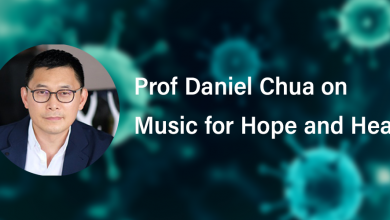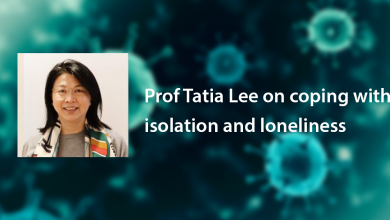Face masks reduce rate of infection and help control epidemic, says HKU expert
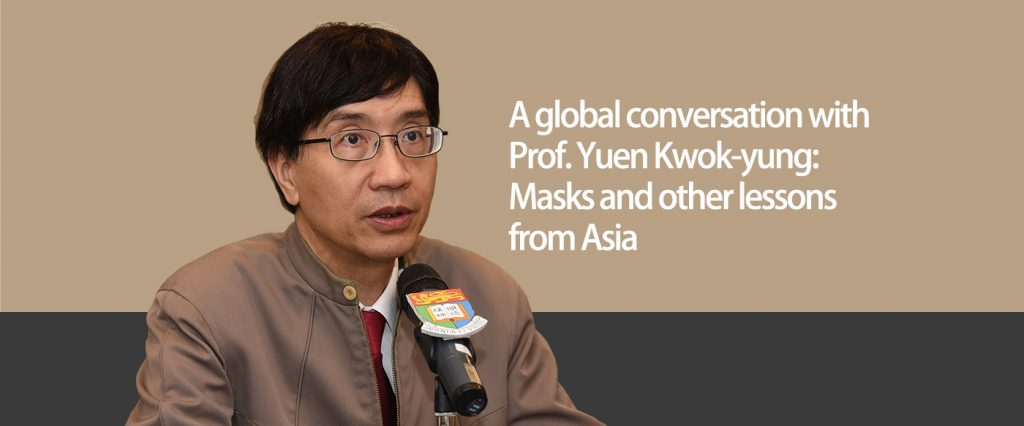
On April 2, 2020, fightcovid19.hku.hk conducted a live conversation with Professor Yuen Kwok-yung, microbiologist, Henry Fok Professor in Infectious Diseases, and Chair Professor of Infectious Diseases at The University of Hong Kong. As the head the Department of Microbiology, he has the rare distinction of being a microbiologist, surgeon, and physician. He graduated from the University of Hong Kong in 1981.
A leading authority in infectious diseases, Professor Yuen made his mark in 2003 when the outbreak of the Severe Respiratory Syndrome, or SARS gripped the globe. He played a key role in the discovery of the agent causing SARS, the SARS coronavirus, thus leading to measures that were crucial to containing the outbreak of the disease.
He has also led his team in the discovery of other disease agents, including the novel human coronavirus HKU1, the bat SARS coronavirus, and many other bacteria named after Hong Kong or China. In January 2020, he published the first Lancet paper on the familial cluster of COVID-19 pneumonia indicating person-to-person transmission.
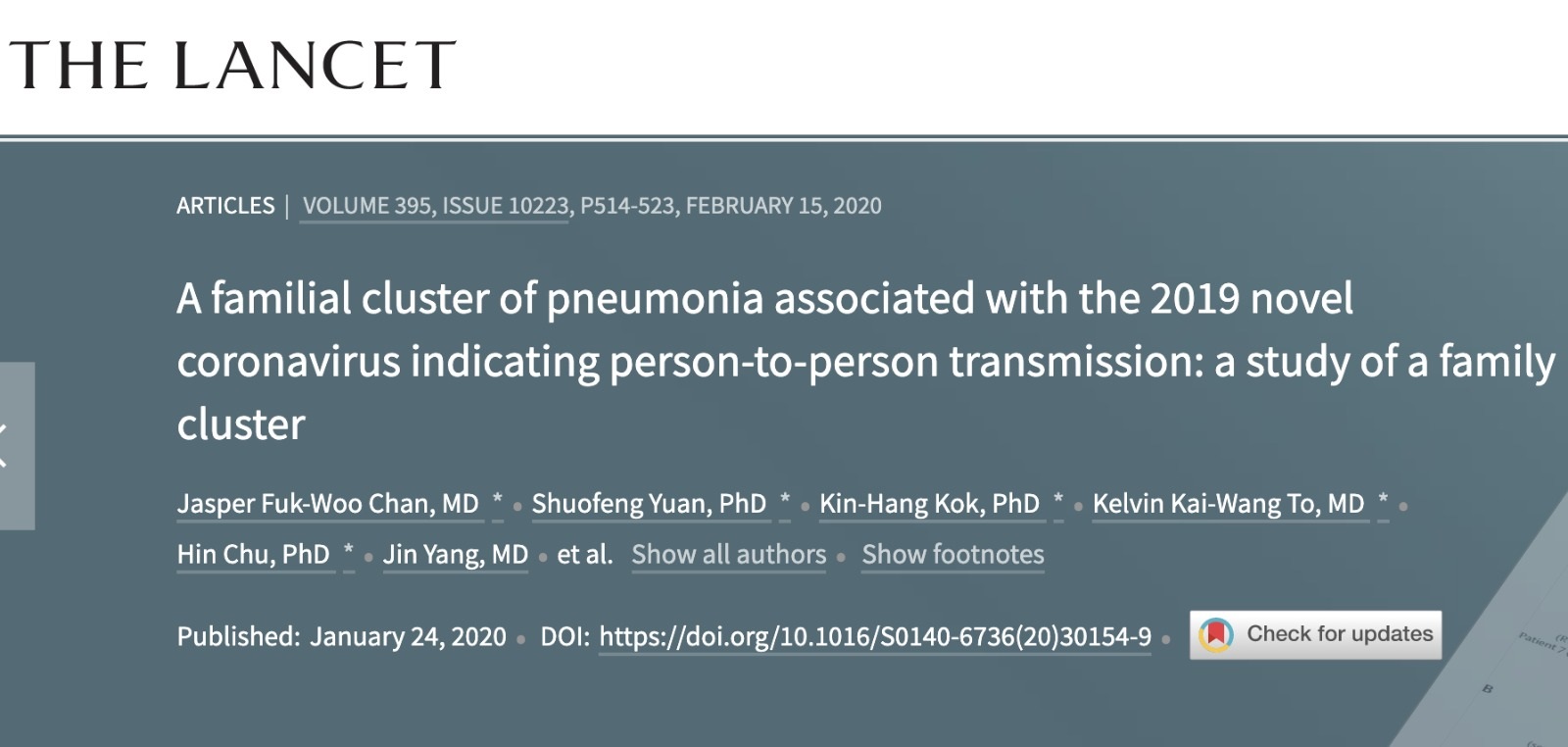
The global conversation was moderated by Sree Sreenivasan , social and digital media expert and Marshall Loeb Visiting Professor of Digital Innovation at Stony Brook University, New York. He lives in New York City.
A strong advocate of universal masking, Prof Yuen explains the benefits of wearing face masks amid the pandemic:
- The most important function of wearing a surgical mask is to protect the public from asymptomatic or subclinical mildly symptomatic individuals who may shed viruses unknowingly.
- Face masks, properly worn, reduce the risk of infection.
- Wide spread use of face masks facilitates the control of an epidemic.
- For the general public, surgical masks are adequate for protection. N95 masks are used by medical personnels.
- When the pandemic is spreading quickly, everyone should wear face masks.
- For effective control of transmission, three elements are needed: face masks, hand hygiene and social distancing. Wearing a mask by itself is not enough.
- In view of the shortage of masks, N95 masks could be disinfected for reuse.
- Wearing face masks is a matter of good citizenship. But the public need to learn the proper way of wearing it.
- DIY masks made of cloth only have 50-70 per cent efficiency, but it’s better than not wearing anything.
- Preparations are needed for schools and businesses to reopen.
Below is a transcript of the dialogue, slightly edited for length. The transcript is published under Creative Commons license: Attribution CC BY![]() . It means that the public is welcome to share, distribute, remix, tweak, and build upon the transcript but must credit https://fightcovid19.hku.hk as the original creator. .
. It means that the public is welcome to share, distribute, remix, tweak, and build upon the transcript but must credit https://fightcovid19.hku.hk as the original creator. .
The benefits of wearing face masks
Sree Sreenivasan: Professor, you just published an article on the controversy over face masks. Can infected individuals reduce the risk of spreading the virus to others by wearing face masks?

Yuen Kwok-yung: When you wear a surgical mask, even if you’re shedding viruses, many of those viruses can’t escape through the mask. So the most important function of wearing a surgical mask is for asymptomatic or subclinical mildly symptomatic individuals who may be shedding viruses unknowingly.
By wearing a surgical mask, the amount of infected respiratory droplets or saliva being shed around is reduced. When a person does not wear a mask, the saliva and droplets that come out would often drop three to six feet away from the person. This can lead to indirect or direct transmission, especially when the other people unknowingly touch such secretions. We know that his virus can survive on surfaces for many days and this is perhaps one other important route of transmission, besides directly infecting people through coughing and sneezing. Wearing a mask protects other people.
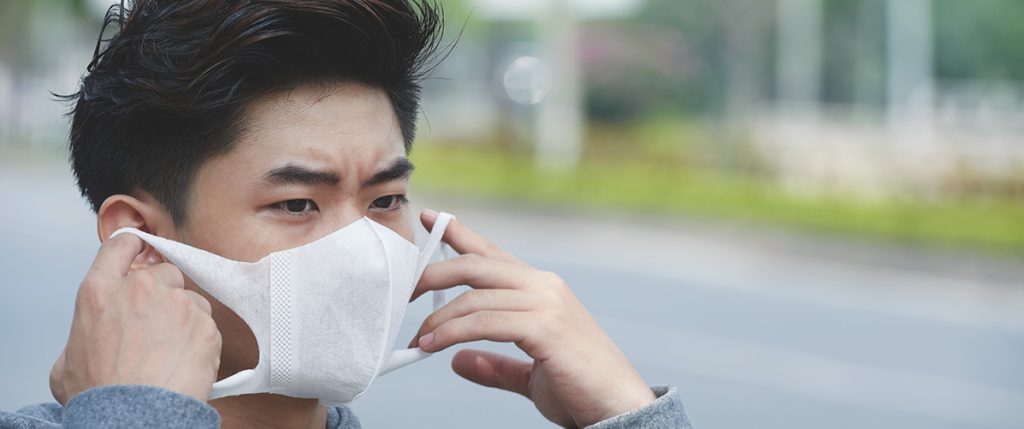
Sree Sreenivasan: Can uninfected people reduce the risk of infection by wearing face masks?
Yuen Kwok-yung: Yes, because we know that the surgical mask can’t be penetrated by secretions. It has a layer on the surface which is water repellent. So any respiratory droplets sprayed onto the mask would be stopped. Secondly it has a filtration function. It can’t filter very small particles that are less than five microns (editor’s note: ≤5 µm, 5 millionth of a millimetre ) in diameter.
But most of the time it is more likely that larger droplets contain more viruses that are harmful to individuals. There is a virus inoculum effect, which means that one virus particle is not sufficient to cause an infection. It may take 40 to 200 viral particles to come into your nose, mouth or respiratory tract to cause an infection. And that’s why these larger particles, what we call respiratory droplets, which contain more viral particles, are likely to get you infected.
Wearing a surgical mask also protects you from getting an infection. One very important point is that even when you have no symptoms, you may have already been infected. Then, of course, by wearing a mask, you’re stopping yourself from becoming dangerous to other people, especially to your family or to people at your workplace. This is particularly important in Hong Kong, where our population density is very high, and where our working or living spaces are very small.
Sree Sreenivasan: Can widespread use of face masks in a given community facilitate the control of an epidemic?
Yuen Kwok-yung: Yes. In a place like Hong Kong, we believe that universal wearing of masks is very important. In addition to our population density and small living spaces, we also have high epidemic pressure from the approximately 50,000 Hong Kong people coming or leaving here every day. That potentially means viruses coming from the mainland or overseas.
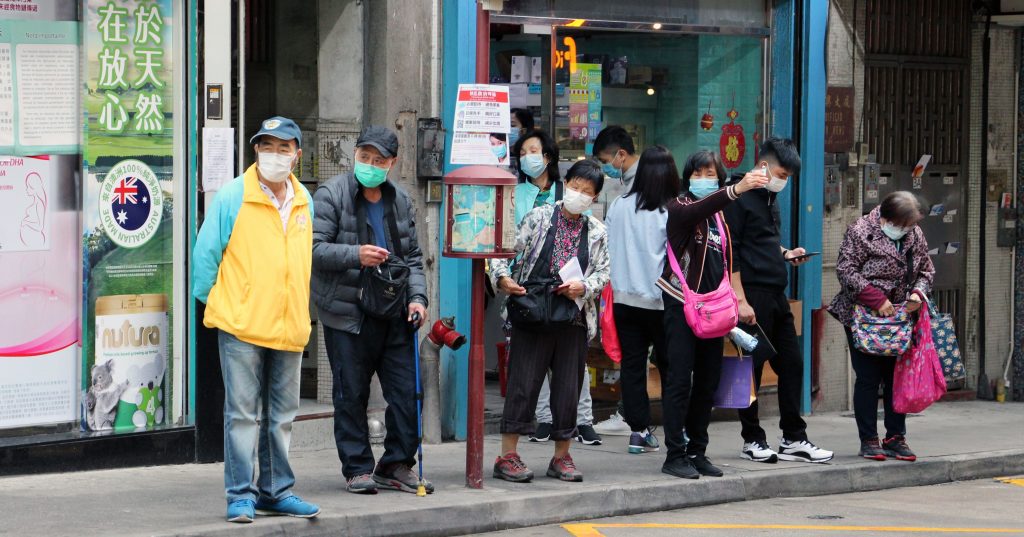
We know a large number of infected people are asymptomatic or mildly symptomatic. By wearing masks, they protect those who are susceptible, but not yet infected. So wearing a mask appears to be a very effective epidemic-control measure at least in our population. Wearing a mask, by the way, has become a symbol of civility in Hong Kong. When you wear a mask, people feel that you are very responsible, very conscientious. When most people wear masks, it will encourage others to.
Another benefit of wearing a mask is that it deters you from touching your face. It might take some training, because the mask may cause some itchiness or irritation and cause people to touch their faces from time to time, but with some training, most people will be able to wear a mask correctly. It is also important to ensure that there is not much leakage around the mask, so that the air that we inhale is filtered.
Differences between a surgical mask and the n95
Sree Sreenivasan: Can you tell us the difference between the surgical mask and the n95?
Yuen Kwok-yung: The surgical mask has a layer of polypropylene material on the outside. In the middle it has a material with a filtration function. On the side that is close to your face is a layer for water absorption that would decrease the amount of moisture around your nose and mouth. This kind of surgical mask can filter particles that are larger than five microns. Of course, there is some degree of leakage, even if you try to seal it around the face. So this kind of surgical mask is generally used under conditions where there is little risk of airborne infection.
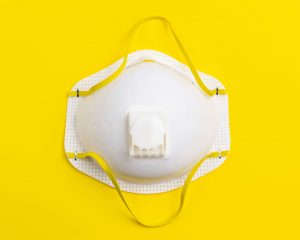 The N95 mask is a highly efficient mask to filter virus particles or droplets less than 5 microns, or even those less than one micron with high efficiency. Now this mask has to be tested before you wear it. We call it the fit test, so that you use the size of a mask or the shape that fits your face. You have to ensure the amount of leakage around your face is less than 5 percent.
The N95 mask is a highly efficient mask to filter virus particles or droplets less than 5 microns, or even those less than one micron with high efficiency. Now this mask has to be tested before you wear it. We call it the fit test, so that you use the size of a mask or the shape that fits your face. You have to ensure the amount of leakage around your face is less than 5 percent.
Unfortunately, this N95 mask is lacking in many localities around the world because everybody wants such high-level protection. The N95 is vital In intensive care units, accident emergency departments, and especially during medical procedures such as bronchoscopy, where you insert an endoscope inside the patient’s airway, which may induce coughing by the patient. In a ward full of patients with Covid-19 infections, where the air in a treatment room may contain a large number of virus particles, you need an N95 mask to protect yourself. But in other situations where the risk of coming close to Covid-19 patients is low, a surgical mask is sufficient. In a place like Hong Kong, a surgical mask is generally sufficient for our protection.
Universal masking helps contain epidemic
Sree Sreenivasan: Why do people in the majority of western countries still refuse to wear masks in community settings? Their excuses vary from incorrect usage of masks to causing shortage for healthcare workers to lack of data. They claim that the success in Asia is due to other measures. What are the medical and the cultural differences that have resulted in this divide.
Yuen Kwok-yung: There is a lot of scientific research going on trying to address this question about whether wearing surgical masks is really useful for protection in a community setting. We have to learn from our past experiences with other acute respiratory diseases and virus infections. If you read the literature on influenza, especially those of systematic analysis, it shows that surgical masks do have an effect in a community setting. Of course it helps in a healthcare setting, but even in a community setting, wearing a mask does reduce the risk of getting infections.
It’s easy to ask people to wear masks here, but it is quite different in a western setting, as wearing a mask is seen as a sign of illness. People tend to refuse to wear one. In the present situation where the pandemic is spreading rapidly, especially in urban areas, it is important to have everybody wearing masks to protect themselves and to protect others. I do think that the changing stance of the US Centers for Disease Control, which is now recommending that people wear masks, is a wise way to go.
Sree Sreenivasan: Should masks be worn by seemingly healthy people?
Yuen Kwok-yung: As mentioned earlier, masks should be worn by seemingly healthy people in highly pandemic areas where you have a major outbreak of infection due to this new coronavirus. The seemingly healthy may in fact be infected, but asymptomatic or very mildly symptomatic. If you adopt universal masking, you’re stopping those mildly symptomatic or asymptomatic individuals from shedding the virus into the environment and also spraying on other people when they are involuntarily coughing or sneezing. Masks should be worn by seemingly healthy people in the present circumstances in all the countries where the epidemic is raging.
Pay attention to good hand hygiene
Sree Sreenivasan: You’ve been ahead of us (Americans), not just in time now, but also in the cycle of the disease. So if you can talk a little bit about that, it would be helpful.
Yuen Kwok-yung: It’s best if you can buy or procure surgical masks, which are multifunctional for filtration and water resistance. These are standard masks that we medical professionals use all the time. But if you can’t buy these standard masks, then you have to make them. And remember that even masks made of ordinary cloth, although they don’t have as high an efficiency rate to filter particles by 90 per cent, they still have the capacity to filter 50 to 70 per cent. In general, the thicker the cloth, the better filtration function it offers. The important thing is that when you make such a mask, you must make sure that it really seals off your nose and mouth, so that when you breathe filtered air. It is still better to have a less efficient mask than to have no mask at all.
Also, remember that wearing a mask is not all that is necessary to prevent infection. The second most important thing is to have good hand hygiene. Hand washing is very important. Sometimes when you are away from home, it’s difficult to wash hands. So it is important to always carry a pocket-sized alcohol hand sanitizer. It should have 70 per cent alcohol and also glycerine to ensure that your hands are not over dehydrated. It is the formula that WHO advocates for the explicit infection control. I always carry it with me, and after I touch something, especially if I want to touch my eyes, nose, or mouth, I use this alcohol hand rub to ensure that any virus particles on my hands are disinfected.
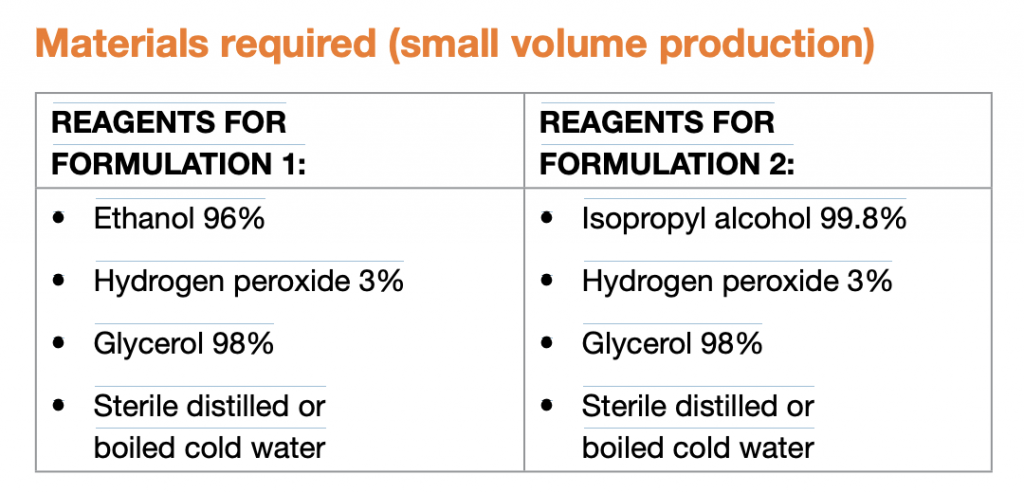
Sree Sreenivasan: Why do you think that there was less appreciation for this in America versus the rest of the world?
Yuen Kwok-yung: I think that the limited supply of masks that developed in the US after the infection began to spread rapidly was a big issue. If there are not enough masks for the medical professionals, then it was difficult for government officials to advocate community use of masks. It is a confusing message. But we have to tell people the truth. The community should wear masks, but we have to make sure health workers are supplied first. In the meantime, make your own masks at home.
Experiments in disinfecting used masks
Sree Sreenivasan: What is the best advice with regards to surgical respirator mask rationing, especially for health care personnel?
Yuen Kwok-yung: In Hong Kong, for example, we have been thinking about how to respond to the limited availability of N95 respiratory masks. We are now doing experiments to show that hydrogen peroxide vapour can disinfect used masks so that they can be used many times. They also can be labelled to make sure they are sent to the same person after disinfection. We have to be innovative because shortages cannot be met within a short time. One of the things that I was doing was to wear a reusable cloth mask inside. So one layer inside, and then the surgical mask outside. After use, I used to ozonize it and then hang it up. I would let all the ozone disappear and then use it again, but again with a reusable cloth mask inside. Besides this, we can use UV light to disinfect masks. We have UV boxes that can be used for surface disinfection of these surgical masks. I do think that we have to innovate.
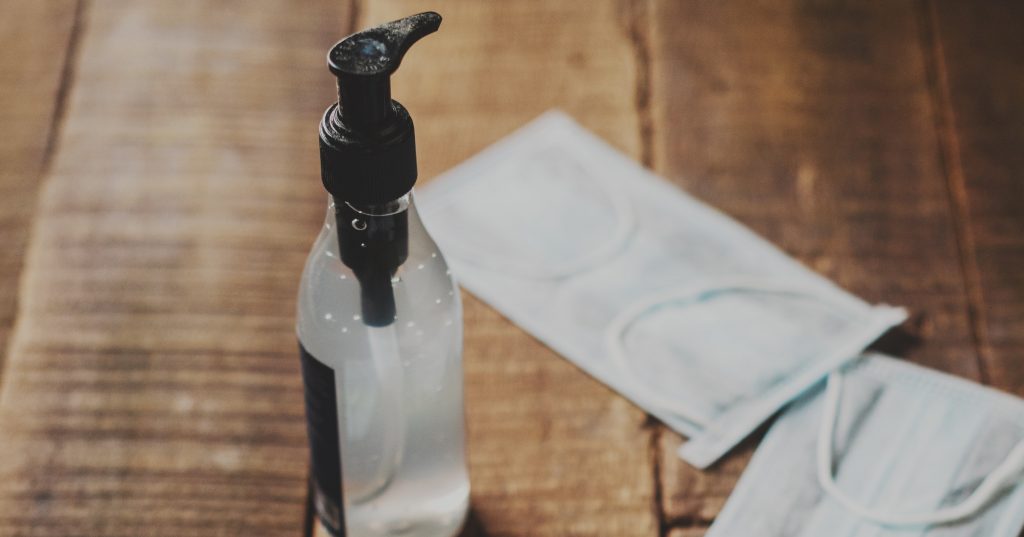
Taking precaution indoors and out
Sree Sreenivasan: What are the precautions one must follow while stepping out of your home? How long do these particles survive on different kinds of materials?
Yuen Kwok-yung: We know that the virus is quite hardy. So depending on the type of surface it drops onto—on a metallic or glass surface, for instance, it can survive a long time. I’m talking about five to seven days at least. If it falls on other cloth material, it survives for a shorter period of time. It also depends on the temperature; it would live longer in a humid environment. If you want to go to the supermarket, always wear a mask correctly and remember to bring your alcoholic hand rub so that you disinfect your hands after touching something. The first thing you should do after arriving home is wash your hands.
In Hong Kong, it is still early spring, and so we always try to open all the windows so that the air change is sufficient. In a hospital ward setting, there are around six air changes per hour but once you open up the window of the hospital room, it is always above 20 air changes per hour. And if there’s some wind, there can be over hundred air changes per hour. So even if there are a number of people inside, any infected droplets that have been coughed out will be carried away very rapidly. In Hong Kong, where the epidemic is still strong, I always wear a mask while meeting people in office, even with the windows open.
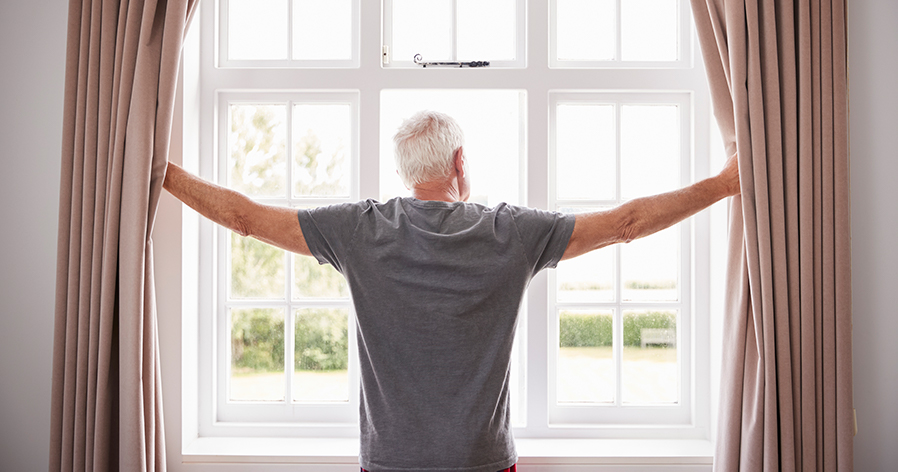
Why the virus is so deadly
Sree Sreenivasan: What makes this virus so deadly and so contagious? And is it constantly mutating?
Yuen Kwok-yung: Firstly, the virus is more deadly than the seasonal influenza but it is less lethal than the 2003 SARS coronavirus. There are a lot of reasons behind that. It all depends on the genetic makeup, the proteins that these viruses are producing. We know that the proteins produced by these viruses antagonize our defense mechanism. This virus also produces some proteins that antagonize our innate immune response and allow the virus to reproduce inside cells. So one virus that enters the cells multiplies into billions of viruses, which are released in the respiratory organs, for example, our lungs. Once you have a lot of viruses in the lung, it induces inflammation and leads to fluid collection which makes breathing difficult and can lead to death. But most people are able to fight this virus effectively. Unfortunately for the elderly and those with underlying medical illness, the innate immune system may not be that effective. So the amount of viruses continues to increase and as time goes by, the infected go into respiratory failure. Around 10 to 20 percent of these elderly patients with comorbidity finally succumb to this infection.
Everyone must take full precaution
Sree Sreenivasan: You are the light of Hong Kong, professor. Your hard work and outspoken approach is being much appreciated by people across the world. How does it make you feel?
Yuen Kwok-yung: Thank you for the kind comments. I just try to do my job well. At the age of 63, I just want to do everything that I can for Hong Kong and for the world. But at the same time, I must emphasize that it is not just surgical masks or respiratory masks that are important. As I mentioned, good hand hygiene, hand washing, alcohol hand rub — all are very important. And then social distancing. You should try to keep people around six tiles away on the floor, so that is around six feet. Try to improve the ventilation of your rooms. Avoid crowded places. All these measures are very important and you must be conscientious. If you develop a cough and sneeze, go get tested. If you can’t get tested, you must try to stay home and don’t go outside to infect other people. Good citizens are very important at the time of a pandemic. Everybody has to do their part.
I’m sure that this epidemic will finally die down, but it will at least take some time before the vaccines are available. Vaccines for this infection are still at least one and a half years away. Making a vaccine is not easy. You have to do a lot of experiments with animals to make sure that the vaccine is safe for the animal. And then you use what we call “virus challenge” to the immunized animals or vaccinated animals to see whether the vaccine is useful and protective. That takes a long time. Then we have to go for the human trials after we have successfully used the vaccine on three different kinds of animals. In phase one of the clinical trial, we have to show the safety of the vaccine. And then we have to go further to look at the immune response in a large number of individuals. Finally, we have to enrol a high number of people to see if the vaccine is really safe and effective. It takes some time before a vaccine is available. Everybody must do their job and follow precautions–wear a surgical mask correctly, maintain good hand hygiene and social distancing.
Sree Sreenivasan: Do you think wearing masks should be made mandatory by authorities once they start relaxing the measures?
Yuen Kwok-yung: I think it is better for the health ministers and authorities to educate people to wear a mask instead of making it mandatory. It is always better to convince people and train them to wear masks instead of using draconian measures or forcing people to wear a mask. And before that happens, you need to have a few weeks of a lot of advertising, a lot of persuasion in the media so that people know that they should wear a mask. Once the lockdown is over, you will have less social distancing and it would be all the more important to wear masks then. Education and persuasion are more important than legal measures to make this possible.
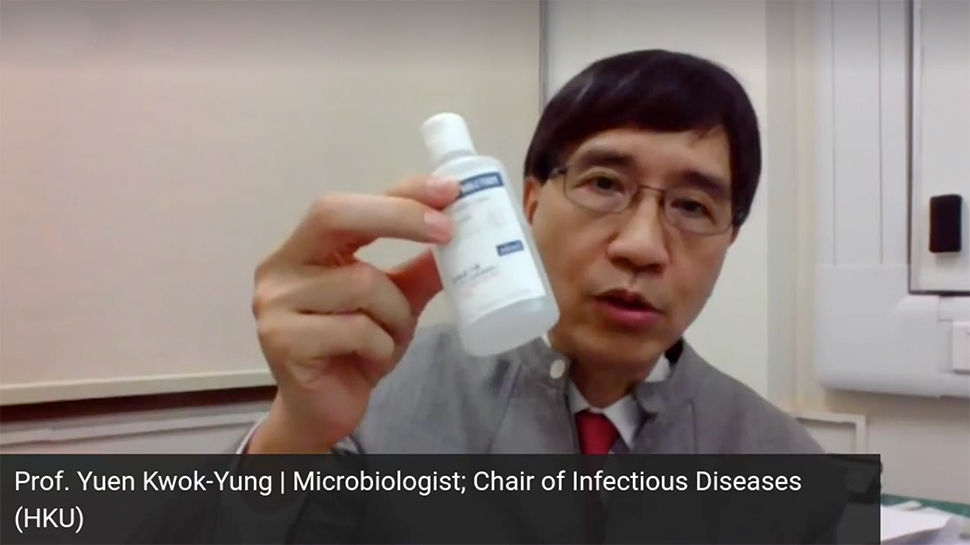
Flattening the curve around the world
Sree Sreenivasan: What will it mean if we hit a million confirmed cases in the world, which we most likely will? Are there countries that can flatten the curve better than the rest?
Yuen Kwok-yung: Despite the fact that Hong Kong is so crowded and there are so many people coming from all over the world and many people crossing the border, we’re still able to maintain a relatively low number of cases of infection.
So I do think that it is possible for any country in the world to control this epidemic. Countries with the largest amount of resources should be able to do it faster if they can convince their people to practice all these measures, like wearing surgical masks, maintaining hand hygiene, social distancing. But I’m really afraid that if the infection rages in Africa or South America, then these developing countries will really have a hard time because many people will die until the herd immunity, or the point where so many people become immune to the virus that it stops spreading, then around one to four percent will have died. This is a huge number, and a calamity for developing countries. The developed countries who have the best resources should stop the epidemic first, and at the same time, try to make vaccines and antivirals as rapidly as possible and then make them available to the developing countries.
Sree Sreenivasan: What is the one thing you would want the US to do in the next three days to limit what’s ahead in the next two weeks?
Yuen Kwok-yung: The most important thing is to take the epidemic seriously. The number would rocket, if things are not done decisively. I do think that the message to the public in terms of personal protection is still not yet sufficient. Every American should be told about personal protection with all these messages about surgical masks, hand hygiene, social distancing clearly related to them. And of course we must be conscientious. If you’re a young, healthy individual, and you get any respiratory symptoms or even a slight degree of fever, you must stay home, wear a mask, try to distance yourself from your family members. Try to eat alone and stay inside your room until you’re much better. Usually after 7-10 days, the viral load in a respiratory secretion goes down. When we check a patient’s saliva suffering from Covid-19, the number of viral particles per millilitre of saliva goes up to around a hundred million in terms of genome copy. That is a huge number. If we are infected, our secretions are laden with a huge number of viral particles and these particles can survive in the very environment for days. So if we are not serious about this situation, it is very difficult to control the epidemic. Even if you’re young and healthy, you must think of your family members. There are always elderly in your community. There are people with underlying medical illness. You think about others, not just yourself. And that is a very important message to control this pandemic.
Sree Sreenivasan: You mentioned hundred million parts per milliliter of fluid. Right?
Yuen Kwok-yung: That’s a hundred million virus particles per milliliter. So very high.
Sree Sreenivasan: How does that compare to SARS, for example, or influenza?
Yuen Kwok-yung: The number is comparable in influenza or other situations, but the Covid-19 virus survives much longer in the environment than what we have seen previously.
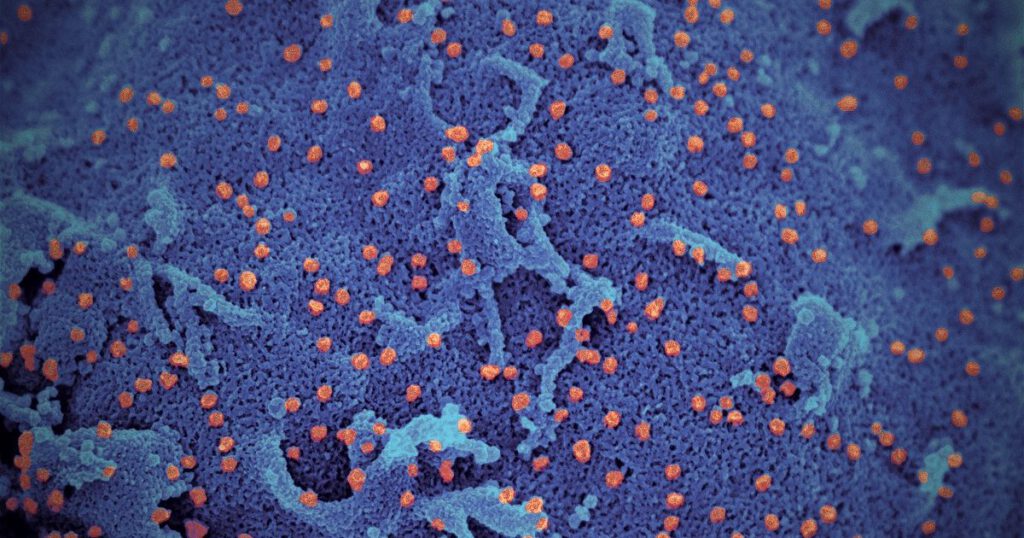
Image courtesy of LKS Faculty of Medicine, Department of Electrical and Electronic Engineering (K.Tsia, K.Lee and Q.Lai), and Electron Microscopy Unit, The University of Hong Kong.
Sree Sreenivasan: Are there any measures schools should adopt when they reopen?
Reopening schools and businesses needs preparation
Yuen Kwok-yung: I think the schools will reopen only after the community epidemic gets stabilized. You will first have all the office workers coming back to work, then the university students and then the secondary school students. Finally, if everything goes well, everything’s stable and there are no major outbreaks after the resumption of work, the primary schools and kindergartens will reopen.
The preparation for the resumption is very important. For instance, for offices, we tell everybody who goes back to have temperature checks done. Make sure you are not running fever and that you’re don’t have any respiratory symptoms. We should have an infection control supervisor in every office. They measure temperature when you come in, and if they spot any symptoms, you are asked to go home. Everybody in office must wear a mask. Before you enter the office, you must do the alcohol hand rub first. We don’t encourage people to go out for tea together. You take a cup of coffee, go back to your own desk and have your coffee. And similarly for lunch. You face the wall when you take off your mask, and eat from your own lunch box. At any time you take off the mask, there is a danger of you infecting other people or other people infecting you. So it is a very important lesson. When you go to church for prayers, you again take off your mask and it’s dangerous. You go out to dine, you take off your mask and again, that makes you very vulnerable.
So you see many of these infection clusters are in the family, in religious settings, in restaurants, bars and karaoke etc. So taking off masks at any time during an epidemic is always dangerous.
Sree Sreenivasan: What about the less privileged parts of the world, where not only masks and hand gel are scarce, but even clean water is inaccessible. What advice do you have for those people?
Yuen Kwok-yung: Life has a lot of limitations. Just try to keep yourself as clean as possible. We understand that they don’t have masks available, but it is still possible to follow social distancing in the underdeveloped areas. Although you don’t even have clean water to clean your hands, social distancing is possible. Try to maintain a balanced diet, do moderate exercise. Always try to maintain adequate circulation of air, which means ventilation by opening windows.
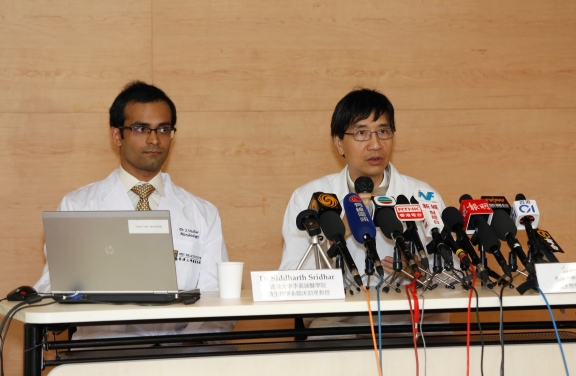
Don’t stigmatize others
Sree Sreenivasan: What are the chances of contracting an infection from someone who is already cured of Covid-19?
Yuen Kwok-yung: Generally, if the fever is gone and the immune system has cleared them, the chances of these people infecting others is quite low. I don’t think that is a cause for worry, but would still advise everybody to wear a mask, maintain personal hygiene and social distancing because there is still a slight risk of these people shedding the virus. These people are already in what we call the convalescent stage of the infection. The chance of a spread is low. Don’t stigmatize these people. Before vaccines and antivirals are available, we have to do our job as good citizens.
Sree Sreenivasan: When one buys groceries, does the virus stay on them? Should one store the groceries at a temperature of five to six degrees celsius or minus 10 degrees celsius.
Yuen Kwok-yung: We maintain the virus alive by putting in at that low temperature. But in general, if those groceries are not being touched or spit upon by other people, it’s safe because most of the time, you wash it first and then cook it. After you cook it, everything should be basically fully disinfected. So that is not an area of great concern. As long as you wash them with water and detergent, you cook it, all’s well.
The epidemic will last
Yuen Kwok-yung: Everybody must understand that it’s a very serious pandemic and it may last for many months. Perhaps it may ease a bit during summer but it may come back in extreme heat. It will go down in autumn, but during winter it will most likely come back. Our research shows that there are 400 people returning from Hubei and only four to five per cent of them have antibodies, which means a lot of people in that high epidemic area haven’t developed herd immunity. So that means the epidemic is going to last until we have a safe and effective vaccine.
To see a replay of the programme, click the following image and share with your friends
[Watch the replay NOW!]In response to the #COVID19 outbreak, governments have imposed lockdown across the globe. What are the role of masks and other measures in containing and mitigating the pandemic? And what are the prospects of a vaccine for the virus?Ask Prof. Yuen Kwok-Yung, Microbiologist, Henry Fok Professor in Infectious Diseases, Chair Professor of Infectious Diseases by sending your question to fightcovid19@hku.hk or tweeting #askHKUMed. He will share his insights on “Masks and other lessons from Asia” of the COVID-19 pandemic and take your questions from around the world.Live Q&A moderated by Sree Sreenivasan from Stony Brook University in New York at 21:00 HKT April 2 (Thur) at the FB Page HKU 100 and Twitter @HKUMed.More info: https://fightcovid19.hku.hk/live3由 HKU 100 发布于 2020年4月2日周四
Related media coverage:
